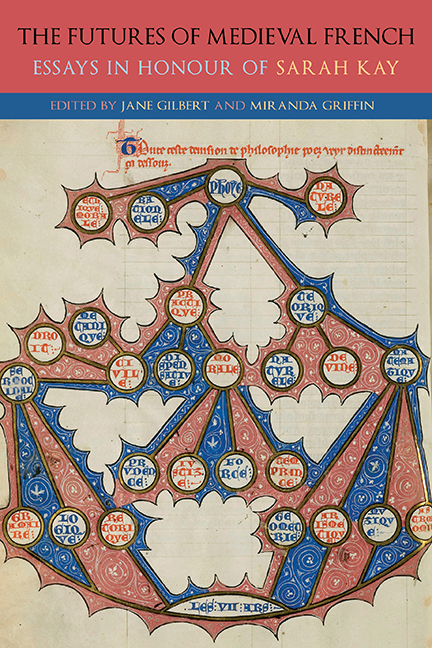Book contents
- Frontmatter
- Dedication
- Contents
- List of Illustrations
- List of Contributors
- List of Abbreviations
- Introduction
- Part I Subjectivity in Troubadour Poetry
- Part II The ‘Chansons de geste’ in the Age of Romance: Political Fictions
- Part III Courtly Contradictions: The Emergence of the Literary Object in the Twelfth Century
- Part IV The Place of Thought: The Complexity of One in French Didactic Literature
- Part V Parrots and Nightingales: Troubadour Quotations and the Development of European Poetry
- Part VI Animal Skins and the Reading Self in Medieval Latin and French Bestiaries
- Afterword
- General Bibliography
- List of Manuscripts
- Bibliography of Work by Sarah Kay
- Index
- Gallica
Introduction
Published online by Cambridge University Press: 27 May 2021
- Frontmatter
- Dedication
- Contents
- List of Illustrations
- List of Contributors
- List of Abbreviations
- Introduction
- Part I Subjectivity in Troubadour Poetry
- Part II The ‘Chansons de geste’ in the Age of Romance: Political Fictions
- Part III Courtly Contradictions: The Emergence of the Literary Object in the Twelfth Century
- Part IV The Place of Thought: The Complexity of One in French Didactic Literature
- Part V Parrots and Nightingales: Troubadour Quotations and the Development of European Poetry
- Part VI Animal Skins and the Reading Self in Medieval Latin and French Bestiaries
- Afterword
- General Bibliography
- List of Manuscripts
- Bibliography of Work by Sarah Kay
- Index
- Gallica
Summary
THIS VOLUME CELEBRATES the scholarship of Sarah Kay, one of the world's foremost scholars of medieval French. Kay's work combines methodological and theoretical rigour to explore medieval literary culture from new and challenging angles; her insights are always innovative and sometimes startling, and have played a major role in shaping our understanding of the field today. This introduction offers a brief overview of her career and publications in order to situate the essays in this book relative to her work. Not only has Kay's scholarship significantly shaped the field, the power of Kay's analyses and range of her materials are such that they attract audiences not usually attuned to medieval French literature. Therefore, and in keeping with Kay's publications, which address writing in Occitan, Catalan, Italian, and Latin as well as Old and Middle French and which maintain a consistent dialogue with other disciplines and periods, we aim to make this volume accessible to readers who are not specialists in medieval French literature, whether students of the French Middle Ages or advanced scholars in other fields.
Kay undertook her undergraduate and research degrees at Oxford, and a Masters degree in Linguistics at the University of Reading. At Oxford, she was taught by two inspirational women medievalists: Rhoda Sutherland, a remarkable teacher, and Elspeth Kennedy, a pioneering scholar of prose romance. Her first professional post was at the University of Liverpool, from where she moved to a university lectureship at Cambridge in the early 1980s. There, Kay became a Fellow of Girton College, where she later served as Senior Tutor (a major administrative post, involving responsibility for the education and welfare of the college's student population); she also undertook the role of Head of the University's Department of French. After two decades in Cambridge, Kay moved to Princeton in 2006 and then to New York University, where, as well as teaching and continuing to produce world-leading research, she held head of department and other influential leadership roles.
For this volume honouring Kay's scholarship, we invited twenty-four academics working across the disciplines of medieval studies to write in response to one of her six major monographs.
- Type
- Chapter
- Information
- The Futures of Medieval FrenchEssays in Honour of Sarah Kay, pp. 1 - 12Publisher: Boydell & BrewerPrint publication year: 2021

